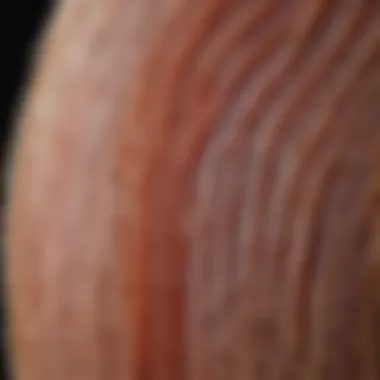Unlocking the Secrets: A Comprehensive Guide to Hair Growth Vitamins for Thinning Hair


Trend Report
When it comes to combating thinning hair, staying abreast of the latest trends in hair growth vitamins is paramount. While the fashion world evolves and shifts, the science behind these vitamins remains a constant anchor for those seeking fuller, healthier hair. Understanding the current trends in these essential nutrients can pave the way for a transformative journey towards revitalizing your hair strands.
Style Guides
In the realm of hair growth vitamins for thinning hair, incorporating essential nutrients into your daily routine is akin to curating a wardrobe of timeless essentials. Just as every woman should have staple pieces in her closet, there are key vitamins that can serve as foundational building blocks for promoting hair growth. By mastering the art of blending these nutrients effectively, you can nourish your scalp and foster the growth of thicker, lusher hair.
Beauty Tips & Hacks
Unveiling the treasure trove of benefits that hair growth vitamins offer transcends conventional beauty routines. Much like makeup techniques that enhance your features, these vitamins work tirelessly behind the scenes to fortify your hair follicles and stimulate growth. Embracing a holistic approach to beauty involves not only skincare routines but also ensuring that your hair receives the nourishment it deserves through vitamin-rich supplements.
Product Reviews
As the beauty industry continues to bloom, a myriad of hair growth products flood the market, each vying for the spotlight. Navigating through these offerings can be overwhelming, but honest reviews and personal anecdotes breathe life into these products, offering insights into their efficacy and impact. By delving into detailed product reviews, you can make informed decisions that align with your hair care goals.
Celebrity Fashion & Beauty
Drawing inspiration from celebrity style icons extends beyond trendy outfits and glamorous makeup looks. Celebrities often divulge their beauty secrets, shedding light on the holistic approaches they take to maintain radiant skin and luscious hair. By peeking behind the curtains of red carpet events and uncovering insider beauty tips, you can adapt celebrity-endorsed practices into your daily routine for hair that exudes star-worthy radiance.
Understanding Hair Thinning
Hair thinning is a common concern that affects both men and women worldwide. In the context of this article, understanding hair thinning plays a crucial role in providing insights into the factors contributing to this issue. By delving deep into the root causes of hair thinning, individuals can make informed decisions on how to address and potentially reverse this condition. Exploring genetics, hormonal imbalances, and nutritional deficiencies as primary causes of hair thinning sheds light on the intricate biological mechanisms at play.
Causes of Thinning Hair
Genetics
Genetics, a fundamental aspect of hair thinning, determines hair follicle sensitivity to androgens which can lead to miniaturization of hair follicles and eventual hair thinning. Understanding the hereditary nature of hair thinning is essential in devising personalized treatment approaches aimed at mitigating genetic predispositions. While genetics can predispose individuals to hair thinning, it also underscores the importance of early intervention and proactive measures to maintain hair health.
Hormonal Imbalances
Hormonal imbalances, characterized by fluctuations in androgen levels, can significantly impact hair growth cycles, leading to increased hair shedding and reduced hair volume. Addressing hormonal imbalances involves regulating hormone levels through lifestyle modifications, dietary adjustments, or medical interventions. By acknowledging the role of hormonal fluctuations in hair thinning, individuals can work towards restoring hormonal equilibrium for improved hair health.
Nutritional Deficiencies
Nutritional deficiencies, such as inadequate intake of essential vitamins and minerals, can impair the hair growth process, resulting in weak and brittle hair prone to breakage. Identifying and rectifying nutritional deficiencies through dietary changes or supplementation is pivotal in supporting optimal hair health. By rectifying nutrient imbalances, individuals can promote healthier hair growth and combat the effects of nutritional deficiencies on hair quality and density.
Impact on Self-Esteem


Psychological Effects
The psychological impact of hair thinning transcends physical appearance, influencing one's self-perception and confidence levels. Coping with the emotional toll of hair thinning requires resilience and self-compassion, emphasizing the importance of seeking emotional support when navigating this journey. Understanding the psychological effects of hair thinning enables individuals to adopt strategies that prioritize mental well-being alongside physical hair restoration efforts.
Social Implications
The social implications of hair thinning encompass societal beauty standards, perceptions of aging, and interpersonal dynamics that can influence an individual's sense of self-worth. Addressing the social ramifications of hair thinning involves challenging stereotypes, fostering inclusivity, and redefining beauty norms to encompass diverse representations of hair types and textures. By acknowledging the social implications of hair thinning, individuals can cultivate a positive self-image and navigate social interactions with confidence and authenticity.
Essential Vitamins for Hair Growth
Hair growth vitamins play a crucial role in addressing thinning hair concerns. By focusing on essential vitamins for hair growth, individuals can promote healthier hair follicles and combat hair loss effectively. These vitamins contain specific elements that nourish the scalp and hair strands, ultimately leading to improved hair health and growth. Understanding the benefits and considerations of essential vitamins for hair growth is paramount in this comprehensive guide to tackling thinning hair.
Vitamin A
Role in Hair Health:
Vitamin A is pivotal for maintaining optimal hair health as it aids in the production of sebum, which moisturizes the scalp and keeps hair strands healthy. The key characteristic of Vitamin A's role in promoting hair health lies in its ability to prevent dryness and potential breakage, fostering stronger and more resilient hair strands. Incorporating Vitamin A into one's diet can be a beneficial choice as it supports overall hair vitality and enhances the growth cycle. Despite its advantages in promoting hair health, excessive Vitamin A intake may lead to adverse effects on hair condition, highlighting the importance of moderation in consumption.
Food Sources:
Rich food sources of Vitamin A include sweet potatoes, carrots, spinach, and liver. These nutrient-dense foods contribute significantly to the body's Vitamin A stores, ensuring adequate levels for optimal hair health. The unique feature of Vitamin A sourced from food lies in its bioavailability, allowing for efficient absorption and utilization by the body. While Vitamin A from food sources offers numerous advantages for hair growth, it is essential to be mindful of potential disadvantages such as excessive intake, which can lead to unwanted side effects.
Vitamin B
Types of Vitamin B:
Vitamin B encompasses a group of essential nutrients such as Biotin and Niacin, vital for promoting hair growth and overall scalp health. Each type of Vitamin B plays a specific role in supporting different facets of hair health, collectively contributing to stronger, fuller hair growth. The key characteristic of Vitamin B lies in its ability to improve blood circulation to the scalp, ensuring essential nutrients reach the hair follicles for optimal growth. Including Vitamin B in one's dietary intake can be a popular choice due to its efficacy in combating hair thinning and promoting overall hair vitality.
Benefits for Hair Growth:
Vitamin B offers a multitude of benefits for hair growth, including strengthening hair strands, reducing breakage, and enhancing hair texture. The unique feature of Vitamin B's role in promoting hair growth is its ability to nourish the scalp, creating a conducive environment for robust hair follicle development. While the advantages of Vitamin B for hair growth are significant, individuals should be cautious of potential disadvantages such as allergic reactions to certain Vitamin B supplements.
Vitamin
Collagen Production:
Vitamin C is instrumental in collagen production, a vital protein for maintaining hair strength and elasticity. The key characteristic of Vitamin C's role in collagen production is its ability to stimulate the body's natural collagen synthesis, supporting hair resilience and flexibility. Opting for Vitamin C as a beneficial choice in promoting hair growth ensures that the hair shaft remains strong and less prone to damage. The unique feature of Vitamin C's collagen production is its antioxidant properties, further protecting the hair from environmental stressors and premature aging.
Antioxidant Properties:


In addition to collagen production, Vitamin C's antioxidant properties play a crucial role in neutralizing free radicals that can damage hair cells and impede growth. The key characteristic of Vitamin C's antioxidant properties lies in its ability to protect the hair follicles from oxidative stress, preserving hair health and vitality. Choosing Vitamin C as a popular choice for promoting hair growth ensures that the scalp remains healthy and fosters an optimal environment for robust hair development. While the advantages of Vitamin C as an antioxidant are substantial, individuals should be wary of potential disadvantages such as vitamin overdosage.
Vitamin
Sun Exposure:
Vitamin D synthesis through sun exposure is essential for maintaining strong and healthy hair follicles. The key characteristic of sun exposure for Vitamin D absorption lies in its direct impact on the body's ability to produce this essential vitamin naturally. Opting for sun exposure as a beneficial choice in obtaining Vitamin D ensures that the scalp receives adequate levels to support hair growth and vitality. The unique feature of sun exposure's role in Vitamin D synthesis is its cost-effective and natural approach to enhancing overall hair health.
Supplementation:
When natural sunlight exposure is limited, Vitamin D supplementation becomes crucial to meet the body's requirements for optimal hair growth. The key characteristic of Vitamin D supplementation lies in its ability to bridge the gap between inadequate sun exposure and the body's vitamin needs. Considering supplementation as a popular choice to maintain Vitamin D levels ensures that hair follicles receive the necessary support for healthy growth. While the advantages of Vitamin D supplementation are noteworthy, individuals should be cautious of potential disadvantages such as excessive intake, leading to harmful side effects.
Supplements for Thinning Hair
Thinning hair is a common concern for many individuals, impacting both men and women of all ages. In the realm of hair health, supplements play a crucial role in promoting hair growth and combatting thinning hair. The significance of incorporating supplements into a daily routine lies in their ability to provide essential nutrients that support hair health from within. These supplements often contain key vitamins and minerals like biotin, iron, and zinc, which are known for their positive impact on hair growth and overall scalp health. For individuals experiencing thinning hair, adding supplements to their regimen can help address underlying deficiencies that may be contributing to hair loss and lack of volume. When selecting supplements for thinning hair, it is important to consider the root cause of the issue and choose products that target specific deficiencies or imbalances.
Biotin
Biotin, also known as vitamin B7, is a water-soluble vitamin that is essential for maintaining healthy hair, skin, and nails. In the context of thinning hair, biotin offers several benefits that can promote stronger and thicker hair growth. It plays a crucial role in the production of keratin, a protein that makes up the structure of hair strands, enhancing their strength and resilience. Biotin supplementation is commonly recommended for individuals looking to improve hair quality and combat issues like hair thinning and breakage. Its ability to strengthen the hair follicles from within makes it a popular choice for those seeking to boost hair growth and overall hair health.
Biotin Benefits
When discussing the benefits of biotin for hair growth, its role in promoting keratin production emerges as a key characteristic. By supporting keratin synthesis, biotin helps fortify the hair strands, reducing the risk of breakage and enhancing overall hair quality. One unique feature of biotin benefits is its ability to nourish the scalp and improve hair texture, leading to thicker and healthier-looking hair. While biotin is widely recognized for its positive effects on hair health, it is essential to note that individual responses to supplementation may vary, necessitating consistent usage and monitoring of results to assess its advantages or potential drawbacks.
Recommended Dosage
Determining the appropriate dosage of biotin is crucial to maximize its benefits for hair growth. Recommended dosages may vary depending on individual needs and existing biotin levels in the body. Generally, a daily dose of 2.5 to 5 milligrams is considered safe and effective for supporting hair health and overall well-being. It is essential to consult a healthcare professional before starting biotin supplementation to determine the optimal dosage based on specific requirements and potential interactions with other medications or health conditions.
Incorporating Vitamins into Your Routine
Incorporating vitamins into your routine is a crucial aspect when aiming to combat hair thinning. By integrating specific vitamins into your daily regimen, you can effectively support hair growth and improve overall hair health. It is essential to understand that consistency is key when it comes to reaping the benefits of these vitamins. Daily incorporation ensures that your body receives a steady supply of essential nutrients vital for promoting hair growth and combatting thinning strands.
Consultation with a Professional
Importance of Medical Advice
Engaging in a consultation with a healthcare professional is a vital step in addressing hair thinning concerns. Medical advice provides personalized insights into your specific condition, enabling you to receive tailored recommendations that cater to your unique needs. This individualized approach ensures that you are following a haircare regimen that is optimized for your hair type and any underlying health issues. Medical advice also offers a comprehensive assessment of potential risks or contraindications associated with certain vitamins or treatments, helping you navigate the complexities of hair growth with expert guidance.
Individualized Recommendations


Receiving individualized recommendations from a professional takes into account factors such as your age, gender, overall health, and nutritional requirements. These personalized suggestions align with your body's specific needs, enhancing the effectiveness of the vitamins you incorporate into your routine. Tailored advice empowers you to make informed decisions about the vitamins and supplements that will support your hair growth journey optimally.
Balanced Diet
Nutrient-Rich Foods
A balanced diet rich in essential nutrients plays a pivotal role in promoting hair growth and combating hair thinning. Incorporating nutrient-dense foods such as leafy greens, nuts, seeds, and lean proteins provides your body with the necessary vitamins and minerals vital for healthy hair development. These nutrient-rich foods supply your hair follicles with the building blocks they need to produce strong, vibrant hair strands, enhancing the overall quality and growth rate of your hair.
Meal Planning Tips
Effective meal planning ensures that your diet is diverse and meets all your nutritional requirements for optimal hair health. When structuring your meals, consider including a variety of foods that are rich in vitamins like A, B, C, and D, as well as minerals like iron and zinc. Strategic meal planning allows you to create balanced meals that support hair growth, reduce nutrient deficiencies, and boost the efficacy of any vitamin supplements you may be taking.
Consistency in Usage
Establishing a Routine
Consistency in using hair growth vitamins is essential to witness meaningful results in combating hair thinning. Establishing a daily routine for taking your supplements ensures that you are adhering to the recommended dosage and frequency. By integrating this routine into your daily habits, you create a structure that prioritizes your hair health, fostering a proactive approach towards addressing hair thinning concerns effectively.
Tracking Progress
Monitoring and tracking the progress of your hair growth journey allows you to evaluate the effectiveness of your routine and make any necessary adjustments. By keeping a record of changes in your hair quality, growth rate, and overall scalp health, you can identify trends and patterns that indicate the impact of the vitamins and supplements you are using. Tracking progress provides valuable insights that help you fine-tune your haircare routine for optimal results.
Considering Other Treatment Options
In the realm of combating thinning hair, exploring other treatment options beyond just vitamins becomes crucial. These alternative strategies can provide a well-rounded approach to addressing hair loss concerns. By delving into the nuances of various treatment methods, individuals can discover additional solutions that may complement the benefits of hair growth vitamins. Seeking topical treatments and professional interventions opens up a realm of possibilities for individuals aiming to revitalize their hair health.
Topical Treatments
Minoxidil
Minoxidil stands out as a prominent player in the arena of hair loss treatment. Its mechanism of action involves improving blood flow to the scalp, promoting hair follicle stimulation, and potentially leading to increased hair growth. The key characteristic that sets Minoxidil apart is its ability to target specific areas of thinning or balding, fostering regrowth in those regions. This topical solution's widespread popularity stems from its proven track record in aiding hair regrowth and restoration. Despite its efficacy, individuals must weigh the advantages and disadvantages of Minoxidil use before incorporating it into their hair care regimen.
Essential Oils
Essential oils represent a natural and holistic approach to addressing hair thinning concerns. These oils, such as lavender, rosemary, and peppermint, boast properties that can nourish the scalp, strengthen hair follicles, and promote healthier hair growth. A key characteristic of essential oils is their versatility, as they can be customized into blends tailored to individual needs. Their rising popularity in the realm of hair care is attributed to their minimal side effects and potential therapeutic benefits. However, delving into essential oil usage requires a nuanced understanding of their unique features and the potential drawbacks to ensure optimal outcomes.
Professional Interventions
PRP Therapy
Platelet-Rich Plasma (PRP) therapy emerges as a cutting-edge option for addressing hair loss concerns. This treatment involves extracting platelets from the individual's blood and injecting them back into the scalp to stimulate hair follicles' growth. The significant characteristic of PRP therapy lies in its natural approach, harnessing the body's healing mechanisms for hair restoration. Its growing popularity stems from its minimally invasive nature and potential for yielding visible results. However, individuals considering PRP therapy should carefully weigh its advantages and disadvantages in the context of their unique hair growth needs.
Hair Transplant
Hair transplant procedures offer a more permanent solution to hair thinning by transplanting follicles from dense areas to those experiencing hair loss. The key characteristic of hair transplants is their ability to provide natural-looking results that can last a lifetime. This surgical intervention's appeal lies in its effectiveness in restoring hair density and improving overall aesthetics. While hair transplants offer significant advantages, individuals must also consider potential disadvantages such as cost, recovery time, and maintenance requirements when contemplating this treatment option.



